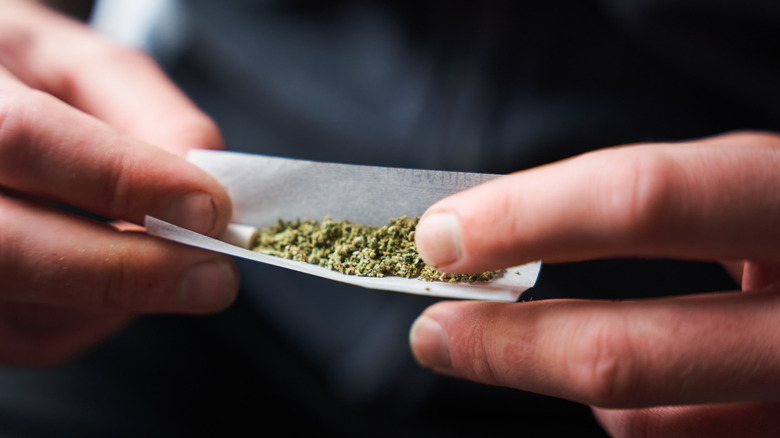
Prostock-studio/Getty Images
According to the authors of “The Health Effects of Cannabis and Cannabinoids: The Current State of Evidence and Recommendations for Research,” scientists have noted modest medicinal benefits from marijuana use, including relief from nausea and vomiting, reduced pain, and improvement of spasticity symptoms in adults with multiple sclerosis (via National Library of Medicine).
However, the U.S. Centers for Disease Control and Prevention (CDC) states that there have also been negative health effects documented for marijuana use, including dependency (cannabis use disorder), cognitive issues, driving impairment, lung damage, mental health disorders, and marijuana overdose.
Also of concern is the potential for marijuana to impact cardiovascular health. Marijuana has been linked to an increased risk of stroke, heart disease, and other vascular diseases (per CDC). Research also indicates that marijuana use can affect blood pressure. However, what happens when you smoke it every day may depend on several factors.
Marijuana has variable effects on blood pressure

Juanma Hache/Getty Images
How long you’ve used marijuana may have some effect on whether your blood pressure goes up or down. The CDC explains that marijuana can make your heart beat faster and cause blood pressure to rise just after you use it.
However, long-term use may actually make blood pressure go down somewhat. A 2023 study published in Scientific Reports, which involved over 91,000 participants from the UK Biobank, looked at how marijuana use might be related to blood pressure. Researchers grouped people based on how often they used marijuana, ranging from never to heavy use, and found that those who used marijuana heavily throughout their lives tended to have slightly lower blood pressure, including systolic (top number), diastolic (bottom number), and pulse pressure. These effects were seen in both men and women, though they were stronger in women. Other factors, like smoking, alcohol use, cholesterol status, and income, seemed to influence the relationship between marijuana use and blood pressure. The authors noted, though, that the observed drops in blood pressure were too small to make any treatment recommendations.
Marijuana’s effects may depend on the relative amount of tetrahydrocannabinolic acid (THC) and cannabidiol (CBD) in the product. While CBD appears to be capable of lowering blood pressure, THC (the component that creates the “high” associated with marijuana use) has the opposite effect. So, in marijuana products with a higher THC content, this could swing the pendulum in the direction of increasing blood pressure.
Should you avoid marijuana if you have high blood pressure?

Fatcamera/Getty Images
While medical marijuana isn’t automatically harmful to blood pressure, some studies have shown a link between marijuana use and high blood pressure, as well as a potential increase in cardiovascular risk when misused.
With that said, any changes in blood pressure resulting from medical marijuana use are usually short-lived and not dangerous. However, if you have high blood pressure, you should speak with your doctor before using marijuana, especially if you are already on medications, since there could be interactions. For example, common drugs such as statins and blood thinners could interact with marijuana, putting you at risk.
Last but not least, factors like dosage, method of use, and any underlying health issues that you have can all influence how marijuana might affect your blood pressure. Your doctor can best help you assess whether marijuana use is safe for you.
Credit: healthdigest.com









